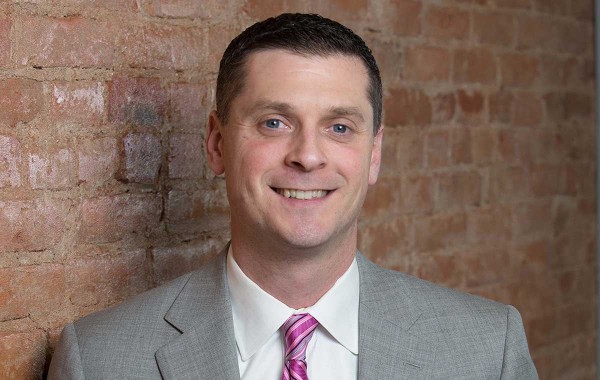Rob Simpson ’97
During his seven years in Washington, D.C. — first as a legislative aide and speechwriter to Senator Jay Rockefeller and later as a lobbyist for a wildlife organization — Rob Simpson ’97 loved the pace of Capitol Hill. But he was ambivalent about whether his efforts were actually making a difference. “No legislation I drafted was ever signed into law,” he said. “I’m not sure any speech I wrote ever changed anyone’s mind.”
Tangible proof of Simpson’s contributions is no longer an issue. When he moved to Syracuse 11 years ago to take a job with an economic development organization, not a week went by without a newspaper article referring to the death of the city’s downtown. Ever the optimist, Simpson had a more forward-looking attitude. “I remember reading those articles and thinking, ‘It doesn’t have to be that way,’” he recalled.
A decade later, Simpson, now president of the CenterState Corporation for Economic Opportunity (CEO), proudly shows off his organization’s new offices in a prominent downtown Syracuse location — the long-abandoned former Witherill’s department store. In addition to office space, the refurbished building also includes retail space and 75 apartments. It’s the latest physical evidence of the rebirth of downtown.
Over the last decade, Syracuse has added 1,500 new residents to its downtown district; public and private investment totaled more than $1.4 billion in just the last two years; and in 2013, 19 new downtown businesses opened their doors. “In a city the size of Syracuse, that’s phenomenal, and it wouldn’t have happened if people had given up on downtown,” he said.
It’s Simpson’s vision. In 2010, he was instrumental in bringing together his former employer, the Metropolitan Development Association, with the Greater Syracuse Chamber of Commerce to merge into the more far-reaching CenterState CEO, which serves as an economic, community, and business development catalyst for a 12-county region in upstate New York (including Madison County, home of Colgate).
“We made a conscious decision to rebrand as a regional entity,” he said. “No one individual community has the scale to be competitive in the global marketplace. We’re better off working together.”
Much of the CenterState CEO’s work is conducted in collaborative partnerships between academia, government, and the private sector. Simpson said he’s never had the same workday twice, spending his time meeting with the region’s business leaders, state and local government officials, and visiting regional manufacturing facilities to further specific economic development projects or tackle long-range goals. Currently on the table: developing a plan to modernize local government.
“Our footprint for local government is 10 times the national average, so we’re trying to get people to step back from their immediate interests and think about how you’d restructure that in a way that is more efficient, more effective, and leads to a long-term better quality of life,” said Simpson, who also serves at the request of Governor Andrew Cuomo as co-chair of the Central New York Regional Economic Development Council.
Too many layers of government — along with high taxes — is one of the oft-cited reasons for the difficulty of doing business in New York State. But that doesn’t stop Simpson from advocating for central New York. “If there’s one lesson I’ve taken from this work, its that you can’t give up,” he said with trademark enthusiasm. “Just because you’re a high-cost state doesn’t mean you can’t be competitive in certain industries. You just have to figure out where you’re competitive and leverage those industries.”
Central New York has a niche in manufacturing heating and cooling equipment, something the CenterState CEO promoted to help secure $3.2 million in federal funding to accelerate a cluster of small and medium-sized businesses that manufacture energy-efficient thermal and environmental controls.
Watching those companies grow and thrive and helping to promote their products to new markets is a thrill for Simpson. “At the end of the day, I can’t drive home without passing by 15 projects I’ve had some hand in making happen,” he said. “I no longer question the impact of my work.”
— Renée Gearhart Levy







